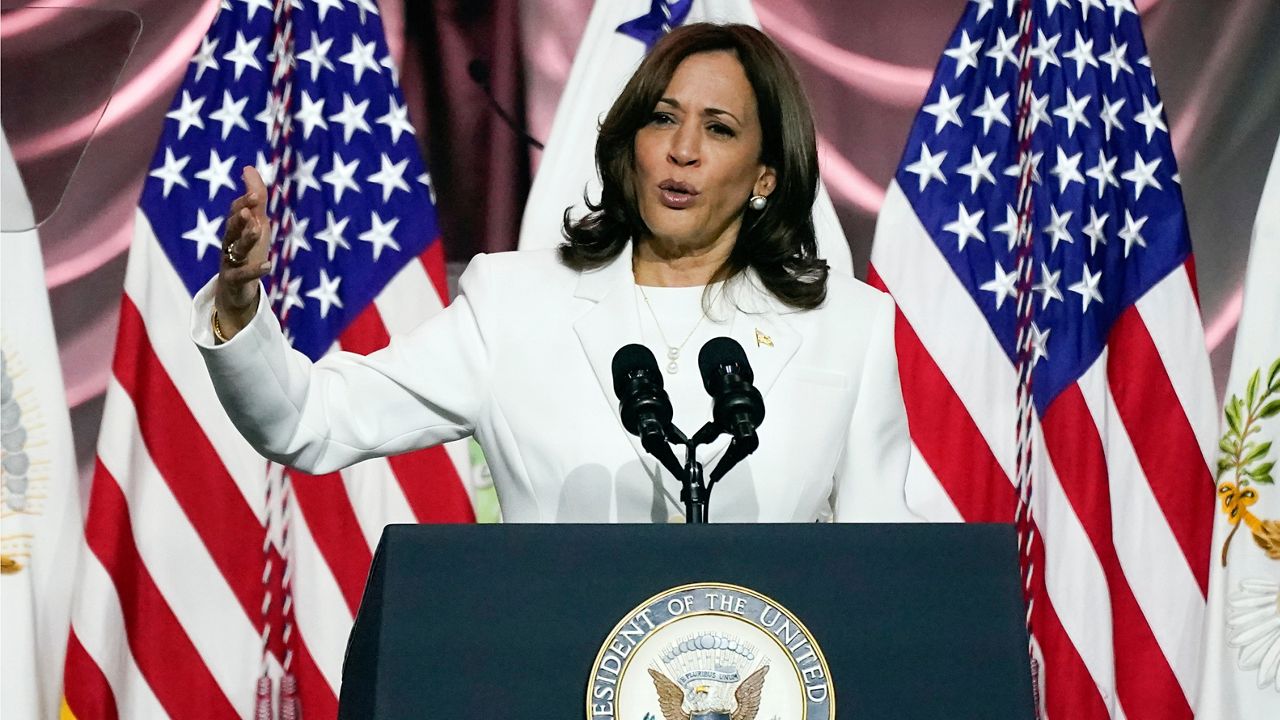At a stop in Orlando on Thursday, Vice President Kamala Harris called out state leaders in Florida who recently approved a 15-week abortion ban without exceptions for rape or incest, calling them “extremist” politicians who “work to restrict rights.”
Harris spoke at an annual gathering of nearly 12,000 members of her sorority, Alpha Kappa Alpha Sorority, Inc., who held their 70th Boule in Orlando.
She called on her fellow sorority sisters to “continue to activate” and build coalitions as they did in 2020, showing up for her, President Joe Biden and “for America,” she said.
“We must do it again this November,” the vice president urged.
“It’s not going to be easy,” she later added. “There are, as there have always been, forces that stand in our way.”
“Forces that include extremist, so-called leaders who instead of expanding rights work to restrict rights,” Harris continued. “So-called leaders who are in the process of criminalizing doctors and punishing women who want to make healthy decisions for themselves.”
Florida’s Republican Governor Ron DeSantis signed a bill in April to make abortion in the state illegal after 15 weeks, and it went into effect on July 1. It provides no exception for women who become pregnant due to rape, incest or human trafficking, but does allow the procedure if it is necessary to save the life of the mother or if the fetus has a fatal abnormality.
Harris flew to Tampa later Thursday, where she was set to visit MacDill Air Force Base and meet with military leaders and service members.
The vice president told reporters earlier Thursday that she made the trip to Florida to discuss abortion rights because she and “a majority of Americans” agree that “women, including the women of Florida” should make reproductive decisions for themselves.
She later held a roundtable on the issue with Florida lawmakers and Health and Human Services Secretary Xavier Becerra.
“We at HHS hope to put into action the instructions you and the president have given us to try to make sure we preserve that access to care,” Becerra said.
President Biden signed an executive order last week directing HHS to do things like protect access to medication abortion and contraception and to clarify women’s right to emergency care in states with abortion restrictions, even when it may include pregnancy loss.
Biden also said earlier this week that he is considering declaring a public health emergency, though a key White House official said that such a move “didn’t seem like a great option.”
Congressional Democrats continue to pressure President Biden to wield more of his executive authority on abortion.
On Thursday, 18 Senate Democrats, led by Sen. Elizabeth Warren, D-Mass., sent a letter urging Biden to declare national and public health emergencies, which would free up federal resources to promote abortion access.
“Millions of American women have been endangered by the Supreme Court’s reckless decision to overturn Roe v. Wade and eliminate the constitutional right to an abortion,” the letter says.
More than 80 House Democrats sent Biden a similar letter Tuesday.
Congressional Democrats are also taking action to try and address abortion rights in the aftermath of the Supreme Court's ruling overturning Roe v. Wade, including legislation to protect patients’ ability to travel across state lines for abortions.
On Thursday, Sen. Catherine Cortez Masto, D-Nev., one of the bill’s lead sponsors, sought unanimous consent for the proposal Thursday, but Oklahoma Republican Sen. James Lankford objected.
The House is expected to pass two abortion-related bills Friday.
One, called the Women’s Health Protection Act, would restore the right to abortion nationwide. The House passed the same bill in September, but it was blocked twice in the evenly divided Senate, where it needed 60 votes to overcome a filibuster.
The other bill, the Ensuring Access to Abortion Act, would bar states from preventing, restricting or retaliating against a woman who travels across states lines for legal abortions.
Leading Democrats, including Vice President Harris and House Speaker Nancy Pelosi, D-Calif., continued their calls to elect more lawmakers who will vote to protect abortion rights.
Harris, in Florida, called on Americans to send "two additional U.S. Senators" to Washington who will protect a woman's right to choose; Pelosi, at a press conference in Washington, expressed a similar sentiment.
"We have to elect a couple more Democratic Senators so that we can get around the filibuster," Pelosi said. "So that we can pass legislation that truly impacts a woman's right to choose."
Spectrum News' Ryan Chatelain and Justin Tasolides contributed to this report.



